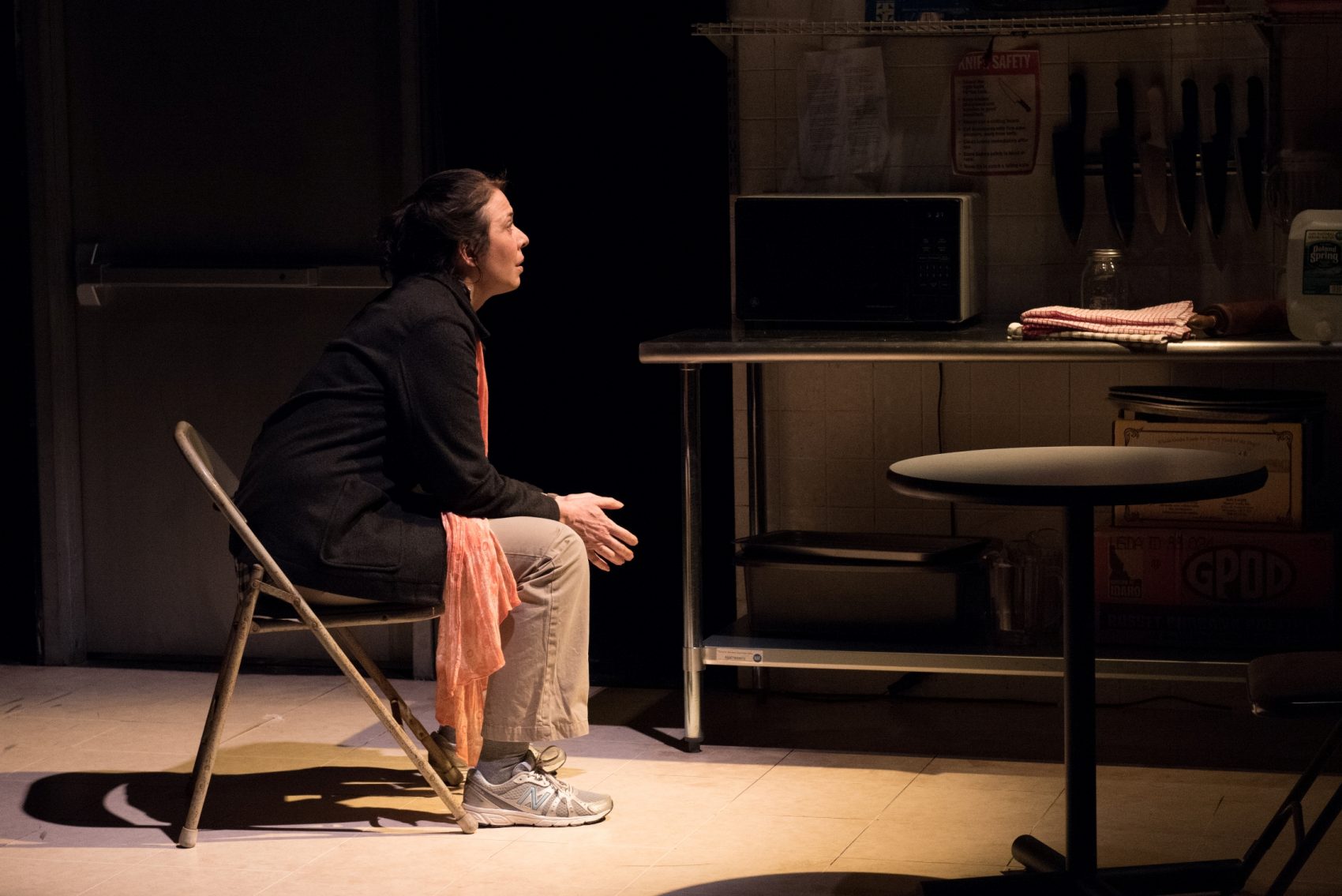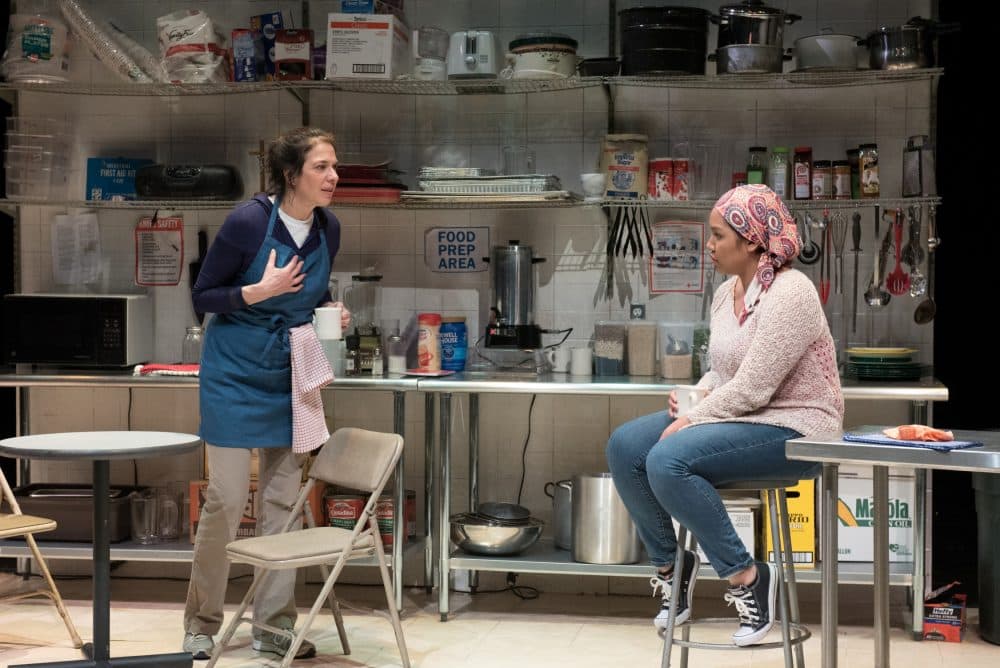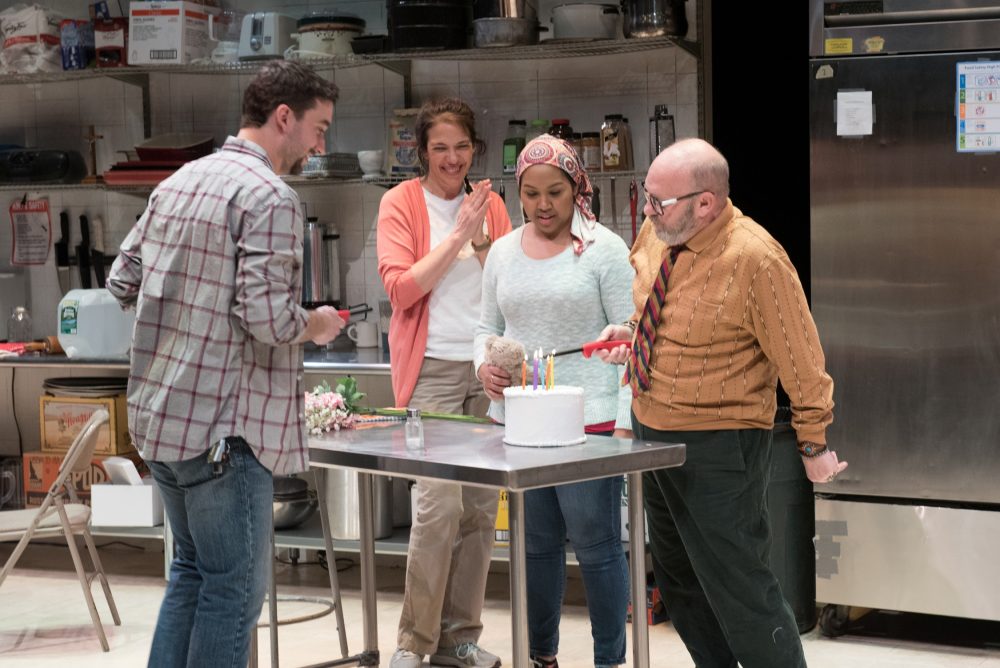Advertisement
Review
In A Church's Soup Kitchen, SpeakEasy's 'Grand Concourse' Contemplates Meaning

Halting, stilted attempts at conversation are nothing extraordinary for relationships at their tentative beginnings or in their final throes. In the SpeakEasy Stage Company production of Heidi Schreck's "Grand Concourse" — a play that's funny and cruel in equal measures, intellectually provocative and emotionally crushing — the main character, Shelley (Melinda Lopez), is having just such a conversation, but with whom? She appears to be addressing a microwave oven. “Uh… sorry, I’m stuck,” she stammers. While to Luddites and technophobes this might appear to be entirely reasonable, anyone else might take it as a sign of crisis.
That would be a correct first impression. As it happens, Shelley isn’t conversing; she’s praying. The microwave isn’t the focus of her attention, but rather a handy way to gauge the time she spends in her efforts to address a higher power. Shelley is a nun, and she’s in charge of a church’s soup kitchen in the Bronx. Her daily challenges include preparing food, supervising volunteers and managing homeless, hungry men, some of whom could — as she warns her newest volunteer, Emma (Ally Dawson) — "snap" at any moment. It’s exhausting work, and it’s left Shelley depleted and doubtful. When she does find the words for her prayers, they are laced with hopelessness. “Forgive me, but it feels pointless lately,” Shelley murmurs. “I’m not even a good cook… My mind is shriveling up here.”

Emma, 19 years old and sporting rainbow colored hair, turns out to be a rare point of light. The new volunteer flirts with Oscar (Alejandro Simoes), the church’s security guard and handy man; she also takes a shine to one of the kitchen’s regular customers, Frog (Thomas Derrah), a smart man driven over the brink, we suspect, in large part thanks to his boundless compassion (though hallucinogens might also have played a role). It’s Frog who summarizes one of the play’s over-arching themes — that of the dubious nature and possibilities of virtue — when he tells Oscar that even vegetarians wreak havoc on the living world with their “murderous teeth.” It’s only when Emma reveals that she’s grappling with a life-threatening illness that spiritual malaise and the flawed physical planes align. But what can you do? The world is a sorry place, and the choices available within it are, to borrow Frog’s word, “bleak.”
Faith, of course, helps fend off despair, and faith can take many forms. Signs and portents of our modern conception of the Almighty may be scarce, but more venerable forms of piety are cited throughout the play, starting with Oscar’s observation that there’s going to be a full moon and continuing with his comparing Emma first to Icarus and then to another figure from Greek mythology, that of Iris, the goddess of rainbows. Emma, in turn, references more earthy and diabolical forces, enthusing about horror movies and quizzing Oscar — who sometimes sleeps in the church in his capacity of security guard — about the presence of ghosts on the property. “Some night I’m gonna show up here,” Emma promises Oscar, “and scare the s--- out of you.” A nocturnal encounter does indeed follow, and it complicates everything.
The play treads a path that’s hardly straight, but certainly narrow. Shelley holds on ever more tightly, her sense of accountability bound up with her control-freak impulses, and Emma, in artful opposition, wavers between the whims of childish impulses and a commitment to mature responsibilities. What it all means, and where it’s all going, are questions hard to fathom, with the outcome impossible to predict. SpeakEasy Stage Company pulls it off, though you might feel the show has taken some skin off you in the process. The only element lacking bite in this production is the music; Lee Schuna’s sound effects are fine, but the score is like something from a 1970s sitcom.

Otherwise, every aspect of the production hits dead-center, and with bruising force. Director Bridget Kathleen O’Leary grounds the play firmly in the sphere of the mundane. The set has a cluttered, banged-up look that fits the setting, with a row of elegantly shaped stained-glass windows floating above the utilitarian work spaces.
The acting, too, is uniformly down to earth — a little more flamboyant than the design work, but naturalistically so; the cast are fluent and effective, but not showy. Derrah, as Frog (always one missed dose of medication from a paranoiac outburst and dressed by costumer Chelsea Kerl in a succession of outfits that can only be described as shabby chic), has plenty of loopy fun, but the others explore rich character terrain as well. Shelley’s tense and mounting doubts, Emma’s wildly erratic mood swings and Oscar’s steadily deepening panic and confusion could all be interpreted as variations on the theme of questioning, or even losing, one’s faith. The actors create flawed, likable people out of their roles. The unexpected flipside that the script presents, and the actors compellingly portray, is that there’s the possibility of liberation in accepting — even embracing — limitations, if not outright failure. In any relationship (romantic as well as divine) we hope for rapture; more often than not, like Icarus, we end up spiraling abruptly out of the sky, victims less of celestial glory than inevitable human frailty.
Schreck — a two-time Obie winner who has also written for television, notably for “Nurse Jackie” and "Billions" — brings assured craftsmanship to the script, but there’s more to it than that. Schreck taps into tangles of complex, conflicting emotions as her raw resource. This deftly-written play doesn’t limit itself to technique and showy surfaces, and as a result “Grand Concourse” isn’t a comedy devoted to the dogma of happy endings and neatly tied narrative bows.